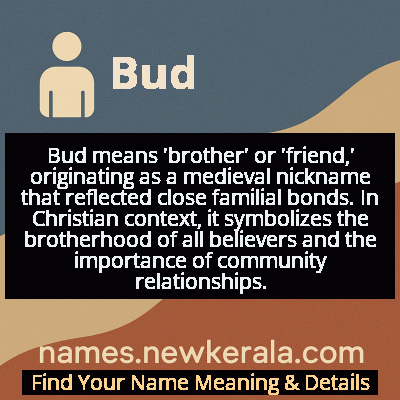Bud Name Meaning & Details
Origin, Popularity, Numerology Analysis & Name Meaning of Bud
Discover the origin, meaning, and cultural significance of the name BUD. Delve into its historical roots and explore the lasting impact it has had on communities and traditions.
Name
Bud
Gender
Male
Origin
Christian
Lucky Number
9
Meaning of the Name - Bud
Bud means 'brother' or 'friend,' originating as a medieval nickname that reflected close familial bonds. In Christian context, it symbolizes the brotherhood of all believers and the importance of community relationships.
Bud - Complete Numerology Analysis
Your Numerology Number
Based on Pythagorean Numerology System
Ruling Planet
Mars
Positive Nature
Generous, passionate, energetic, and humanitarian.
Negative Traits
Impulsive, impatient, moody, and can be overly emotional.
Lucky Colours
Red, maroon, scarlet.
Lucky Days
Tuesday.
Lucky Stones
Red coral, garnet.
Harmony Numbers
1, 2, 3, 6.
Best Suited Professions
Military, sports, philanthropy, leadership roles.
What People Like About You
Courage, energy, leadership, generosity.
Famous People Named Bud
Bud Abbott
Comedian/Actor
Half of the famous comedy duo Abbott and Costello, known for their 'Who's on First?' routine
Bud Grant
Football Coach
Legendary NFL coach who led the Minnesota Vikings to four Super Bowl appearances
Bud Selig
Baseball Commissioner
Served as Commissioner of Major League Baseball and oversaw significant expansion and modernization
Bud Cort
Actor
Known for his iconic role in the film 'Harold and Maude' and numerous other acting performances
Name Variations & International Equivalents
Click on blue names to explore their detailed meanings. Gray names with will be available soon.
Cultural & Historical Significance
The name gained particular prominence in American culture during the 19th and 20th centuries, often representing the ideal of fraternal love and companionship that aligned with Christian values of community and mutual support. Its usage reflects the Christian emphasis on seeing all people as brothers and sisters in faith, making it a name that carries both personal and spiritual significance. In many Christian traditions, the concept of brotherhood extends beyond biological family to include the entire community of believers, giving the name Bud a deeper religious dimension that connects individual identity with collective faith.
Extended Personality Analysis
Individuals named Bud are typically perceived as friendly, approachable, and dependable, often embodying the brotherly qualities suggested by the name's meaning. They tend to be natural peacemakers who value harmony in relationships and excel in team environments where cooperation is essential. Their warm and genuine nature makes them excellent friends and confidants, with a strong sense of loyalty to those they care about. People with this name often display a practical, down-to-earth quality that makes them reliable in both personal and professional contexts.
Buds are often practical problem-solvers who approach challenges with level-headedness and persistence, showing resilience in difficult situations. They typically possess a subtle strength that emerges when supporting others or standing up for what they believe is right. This combination of reliability and approachability often makes them natural leaders in informal settings, though they may prefer collaborative leadership styles over authoritarian approaches. Their personality often reflects the Christian values of service, community, and steadfastness, making them pillars in their social circles who others naturally turn to for support and guidance.
Modern Usage & Popularity
In contemporary times, Bud is primarily used as a nickname or informal given name rather than a formal first name, though it maintains a nostalgic charm that appeals to some parents seeking vintage names. Its popularity peaked in the United States during the early to mid-20th century, particularly between 1920-1950, but has since declined significantly as a given name while remaining common as a nickname for names like Bradley, Burton, or Budworth. The name carries a distinctly American mid-century vibe and is often associated with reliability, traditional values, and approachability. Current usage trends show it appearing more frequently in creative contexts, such as characters in media or as affectionate family nicknames, rather than as legal given names on birth certificates.
Symbolic & Spiritual Meanings
Symbolically, Bud represents new beginnings, potential, and growth—much like the botanical bud that contains the promise of a flower yet to bloom. This connects to Christian symbolism of spiritual growth and the potential within each person to develop and flourish in faith. The name also carries strong connotations of brotherhood, friendship, and loyalty, symbolizing the bonds that connect people in family and community. In a metaphorical sense, Bud embodies the idea of nurturing relationships and watching them develop over time, much like tending to a plant. The combination of these meanings creates a rich symbolic tapestry that encompasses both personal development and interpersonal connections, making it a name that suggests both individual potential and communal belonging within the Christian framework of spiritual brotherhood.

